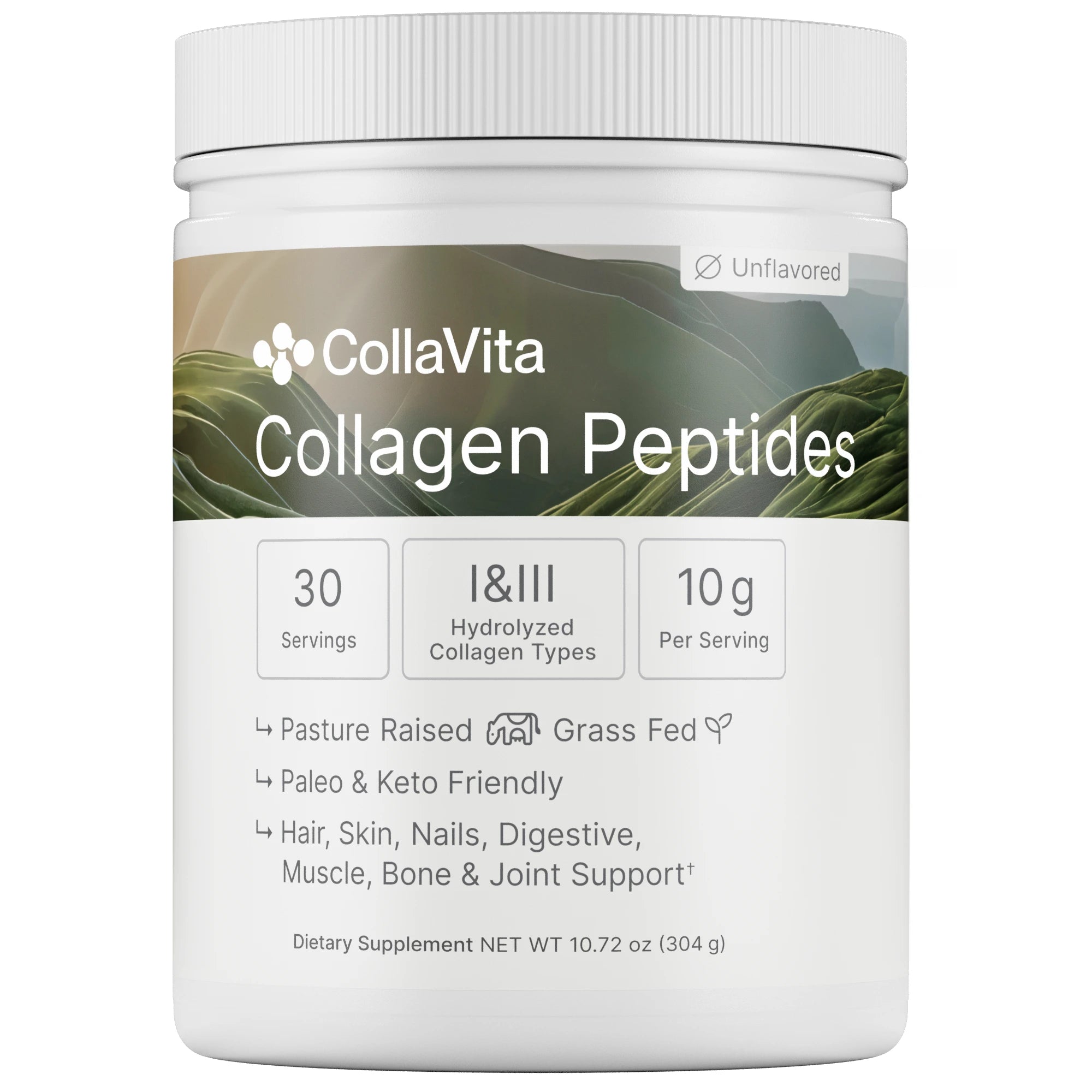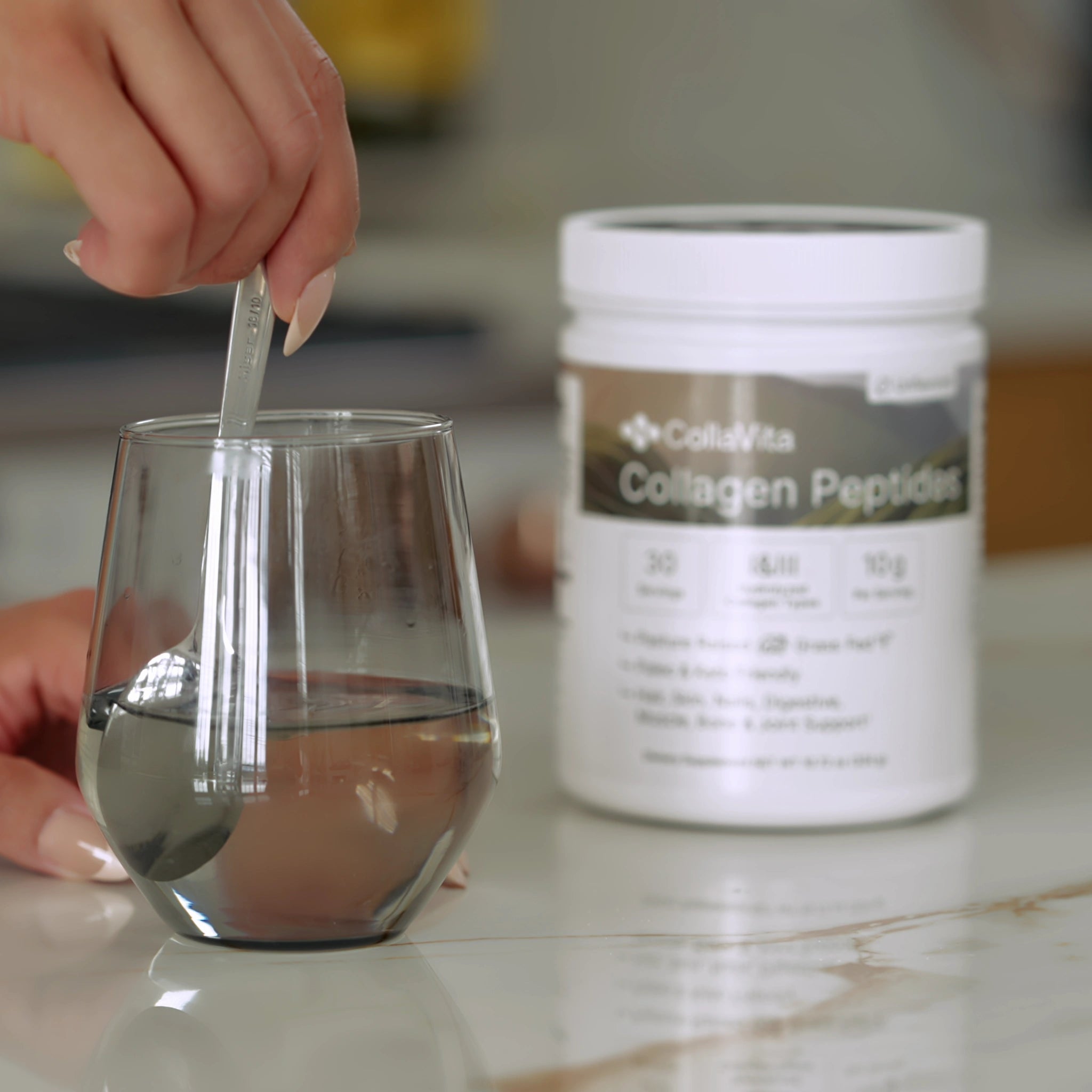What are the Common Side Effects of Collagen Supplements?
While collagen supplements are generally well-received by most individuals, it's wise to be aware of the more commonly reported, though typically mild, side effects:
- Digestive Discomfort
- Allergic Reactions
- Unpleasant Taste or Smell
Digestive Discomfort
- Bloating: A feeling of fullness or swelling in the abdomen.
- Mild gastrointestinal discomfort: A sensation of being overly satisfied even after consuming a normal amount of food.
- Occasional Heartburn: A burning sensation in the chest, often after eating.
Allergic Reactions
- Marine collagen (from fish): Presents a higher risk for those with known allergies to fish or shellfish
- Bovine collagen (from cattle): Carries a potential risk for individuals with beef allergies.
- Porcine collagen (from pigs): May cause reactions in those sensitive to pork products.
Unpleasant Taste or Smell
What Are the Rare Side Effects and Concerns of Collagen Supplements?
- Potential Kidney Strain
- Hypercalcemia Concerns
- Cardiovascular Effects
- Standardization and Quality Concerns
Potential Kidney Strain
High-quality collagen supplements generally pose a minimal risk to kidney health in individuals with normal renal function. However, some lower-quality products might contain trace amounts of heavy metals or other contaminants that could potentially impact kidney function with prolonged use.
The study by Gupta et al. (2024), published in Cureus and titled "A Comprehensive Review of Biomarkers for Chronic Kidney Disease in Older Individuals: Current Perspectives and Future Directions"(4) emphasizes the importance of biomarkers for the early diagnosis and management of chronic kidney disease. This review examines how traditional and novel biomarkers contribute to a more accurate understanding of kidney health.
The review specifically highlighted that low-quality collagen may contain trace quantities of oxalate, which could potentially increase the risk of kidney stone formation in susceptible individuals. Therefore, individuals with a history of kidney stones or impaired renal function should always consult with their healthcare provider before starting collagen supplementation.
Hypercalcemia Concerns
Some researchers have theorized that marine collagen supplements, especially those derived from fish bones, might contain elevated calcium levels that could potentially lead to hypercalcemia (high levels of calcium in the blood) in susceptible individuals. However, the general scientific consensus is that collagen supplements do not directly increase serum calcium levels. Collagen and calcium have different functions; while calcium is an essential mineral for bone strength, collagen is a protein that provides structure to bones, skin, and connective tissues. Nevertheless, since marine-sourced collagen products can naturally contain calcium, individuals with pre-existing kidney conditions or a risk of hypercalcemia should consult healthcare providers before using such supplements.
Cardiovascular Effects
The researchers observed that "the decrease in systolic blood pressure associated with collagen peptide supplementation may significantly reduce the risk of heart disease and stroke in at-risk populations." This finding suggests that collagen supplements may offer cardiovascular benefits without posing risks when used appropriately.
Standardization and Quality Concerns
A significant area of consideration with collagen supplements revolves around standardization and quality control within the industry. Currently, there's a lack of universally standardized methods for the extraction and purification of collagen, particularly marine collagen. This inconsistency can contribute to variations in the purity, efficacy, and potential for allergic reactions among different collagen supplements.
This means that the quality and effectiveness of collagen supplements can differ considerably depending on the manufacturer and their processes. As a consumer, it's essential to prioritize products from reputable companies that are transparent about their sourcing and ideally conduct independent, third-party testing to ensure the quality and purity of their collagen. Look for certifications or seals of approval from recognized organizations that verify the contents and safety of dietary supplements. Choosing high-quality, well-vetted products is a crucial step in maximizing the benefits of collagen while minimizing potential risks.
How to Minimize the Risk of Side Effects?
The good news is that many healthcare professionals, nutritionists, and scientists agree that the side effects of collagen peptides are generally minimal for healthy individuals. However, if you are currently taking medication, have a sensitive digestive system, or have any reason to believe your body might react differently to supplements, consider these strategies to minimize potential side effects:
-
Start Slow and Increase Dosage Gradually: Allow your body to adapt to collagen supplementation by starting with a lower dose than recommended and gradually increasing it until you reach your optimal intake. This approach gives your digestive system time to adjust and reduces the likelihood of gastrointestinal discomfort.
-
Choose High-Quality Products: Selecting high-quality collagen supplements is paramount for minimizing potential side effects and maximizing the benefits. Low-quality products may contain harmful contaminants such as heavy metals, pathogens, pesticides, herbicides, genetically modified organisms, and even traces of animal excrement.
-
Consider Temperature Effects: Research suggests that high temperatures, like those in very hot beverages, can negatively impact the quality of collagen supplements.
-
Drink Plenty of Water: Staying adequately hydrated is crucial when taking collagen supplements. Drinking at least 8 ounces of water around two hours after taking your collagen, or with meals, helps with better absorption and can reduce the chances of digestive discomfort.
-
Consider Your Allergies: When choosing collagen supplements, always be mindful of potential allergic reactions, particularly if you have known allergies to specific protein sources. If you have a seafood allergy, it's best to consider alternatives to marine-derived collagen.
-
Consult Healthcare Professionals: If you're currently taking any medications or managing any pre-existing health conditions, it is essential to consult with your healthcare provider before starting collagen supplementation. This is particularly important for pregnant or breastfeeding women, individuals with chronic health conditions, those taking multiple medications, and people with a history of allergic reactions to supplements.
- Optimal Timing: If you find that collagen supplementation causes you gastrointestinal issues, try adjusting the timing of when you take it. Taking collagen with your meals or in the morning with breakfast can often help to reduce digestive discomfort.

Is Collagen Safe for Everyone?
Collagen is widely considered safe for healthy individuals to take as a supplement, with numerous studies confirming its safety profile. A systematic review published in the Nutritional Medicine Journal in 2022, Collagen: A Review of Clinical Use and Efficacy(5), notes that many different forms of oral collagen are considered highly biocompatible and safe as a supplement. The study strongly suggests that collagen supplements have positive therapeutic effects on osteoarthritis pain management, blood sugar control in type II diabetes, wound healing, skin aging, and post-exercise body composition and strength.
A comprehensive safety assessment conducted by the Cosmetic Ingredient Review (CIR) Expert Panel, an independent organization that evaluates the safety of cosmetic ingredients, provides important information regarding the safety of collagen and related proteins. This assessment, titled "Safety Assessment of Skin and Connective Tissue-Derived Proteins and Peptides as Used in Cosmetics"(6) states that while 19 collagen and connective tissue-derived proteins and peptides were evaluated as safe.
Ingredients Evaluated as Safe:
- Ammonium Hydrolyzed Collagen
- Atelocollagen
- Calcium Hydrolyzed Collagen
- Collagen
- Elastin
- Fibronectin
- Gelatin
- Hydrolyzed Actin
- Hydrolyzed Elastin
- Hydrolyzed Fibronectin
- Hydrolyzed Collagen
- Hydrolyzed Gelatin
- Hydrolyzed Reticulin
- Hydrolyzed Spongin
- MEA-Hydrolyzed Collagen
- Soluble Collagen
- Hydrolyzed Spongin
- Soluble Elastin
- Zinc Hydrolyzed Collagen
This safety profile makes collagen supplements suitable for most adults, although individual responses may vary depending on personal health factors and the specific collagen product used.
Frequently Asked Questions About Collagen Side Effects
Can collagen supplements cause allergic reactions?
Are there any digestive side effects from taking collagen?
Are there vegan alternatives to collagen supplements that don't cause side effects?
Can collagen supplements interact with medications?
Is collagen safe during pregnancy and breastfeeding?
SOURCES
(1) - Abrahams M, O'Grady R, Prawitt J. Effect of a Daily Collagen Peptide Supplement on Digestive Symptoms in Healthy Women: 2-Phase Mixed Methods Study. JMIR Form Res. 2022 May 31;6(5):e36339. doi: 10.2196/36339. PMID: 35639457; PMCID: PMC9198822.
(2) - Wang, H. A Review of the Effects of Collagen Treatment in Clinical Studies. Polymers 2021, 13, 3868. https://doi.org/10.3390/polym13223868
(3) - Xilong Wang, Bei Le, Na Zhang, Kathrine H Bak, Yuhao Zhang, Yu Fu, Off-flavour compounds in collagen peptides from fish: Formation, detection and removal, International Journal of Food Science and Technology, Volume 58, Issue 3, March 2023, Pages 1543–1563.
(4) - Gupta, S., Kumar, R., & Singh, S. (2024). A Comprehensive Review of Biomarkers for Chronic Kidney Disease in Older Individuals: Current Perspectives and Future Directions. Cureus, 16(9), e68798.
(5) - Steele, C. (2022) Collagen: a review of clinical use and efficacy. Nutr Med J., 1 (2): 12-36.
(6) - Cosmetic Ingredient Review Expert Panel. (2006). Safety Assessment of Skin and Connective Tissue-Derived Proteins and Peptides as Used in Cosmetics. International Journal of Toxicology, 25(Suppl 2), 1-132.
Scientifically Reviwed by Omer (Matt) Sermet














